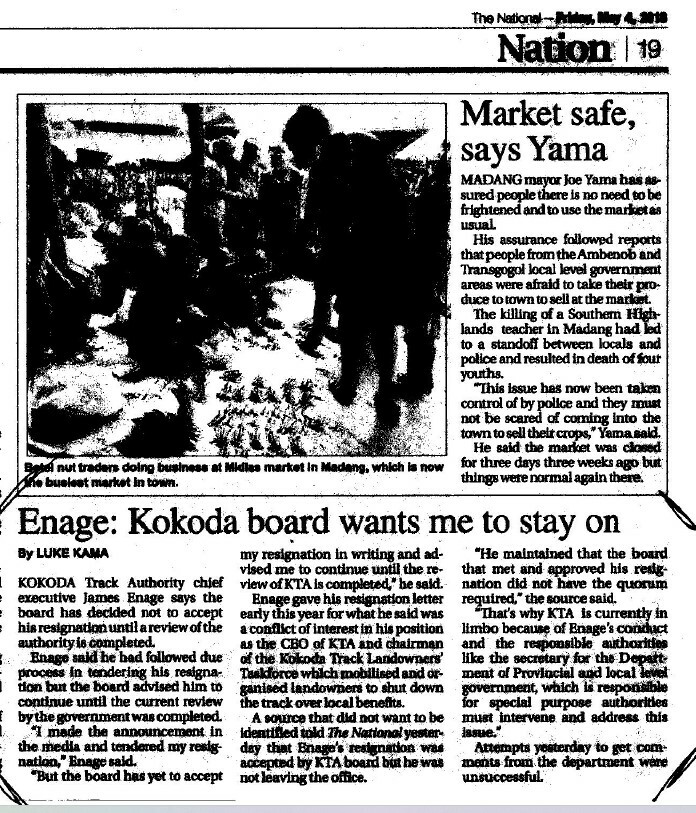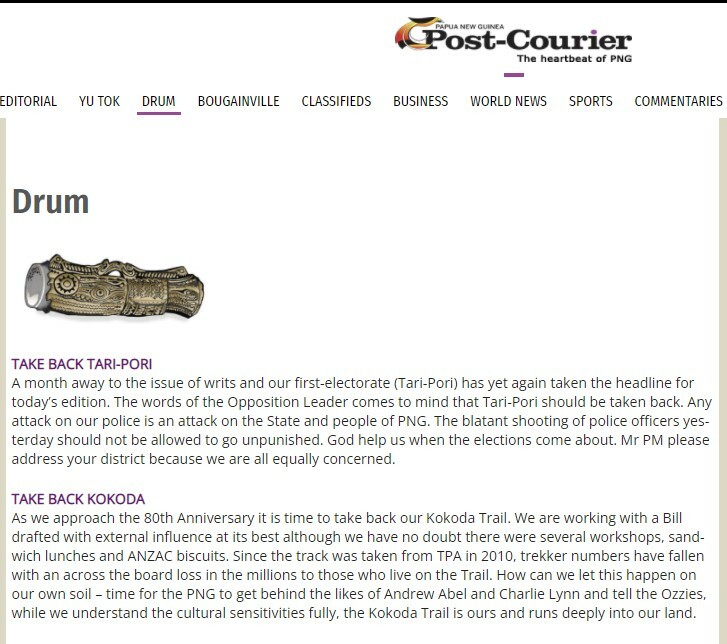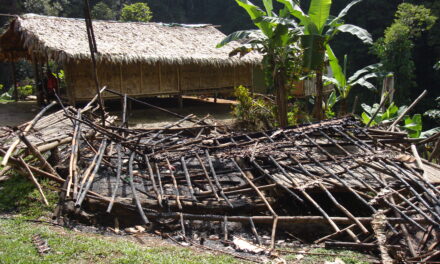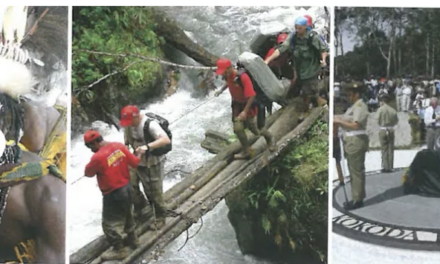The National – 27 February 2019
Papua New Guinea’s pristine, rugged, and remote environment is managed by their Conservation Environment Protection Authority (CEPA) and the recently proclaimed Climate Change Authority. Eight (8) Acts of Parliament have been proclaimed by the PNG Government to protect this most valuable resource.
It is also well protected by subsistence villagers who understand the importance of the natural environment for their local livelihoods.
A recent attempt by an Australian DFAT official to use ‘Kokoda‘ as a trojan horse for introducing a new environmental management authority for an area well beyond the gazetted boundaries of the wartime Kokoda Trail, without consultation with traditional landowners, has raised suspicions about intent and concerns about possible ‘foreign interference’.
The following Acts of Parliament were developed to protect the environment in PNG:
- Fauna (Protection and Control) 1966;
- Conservation Areas Act, 1978 – amended in 1989 and 1992 respectively;
- National Parks Act, 1982;
- The Mining Act;
- The Oil and Gas Act;
- The Forestry Act;
- The War Surplus Material Act 1952; and
- The National Cultural Property (Preservation) Act 1965.
On 27 February 2019, the PNG National Newspaper reported ‘Legislation for new entity to manage Kokoda underway’.
It was an innocuous article that didn’t raise any eyebrows due to the ongoing dysfunction and corruption within the Kokoda Track (Special Purpose) Authority (KTA) over the years.
The article advised a Review of the KTA had been completed and draft legislation was underway.
The Strategic Advisor for the Kokoda Initiative, and Secretary to the influential ‘Ministerial Kokoda Initiative Committee’ (KIC), Mark Nizette, advised that two independent reviews had already been undertaken, one by the KIC and the other by the Department of Provincial and Local Level Government Affairs (DPLLGA).
No information has been disseminated regarding the ‘independent review’ conducted by DPLLGA. It was noted however that a Deputy Secretary of the Department, Mr. Julius Wargirai, had been appointed ‘Acting CEO’ of the KTA in late 2018. Wargiral seemed to be working directly for Mark Nizette who had moved back into the KTA office after a four-year stand-off with the former CEO of the KTA, James Enage.
Nizette was a former Assistant Secretary for International Heritage at the Department of Sustainability, Environment, Water, Population and Communities (DSEWPC), before his assignment as ‘Management Advisor’ to the PNG Conservation Environment Protection Authority (CEPA).
At the time DFAT operated a ‘Kokoda Development Program’ from the offices of the Australian High Commission while DSEWPC funded the ‘Kokoda Initiative’ within CEPA. It is a matter of record that the two Australian funded programs were not in sync which created confusion and duplication amongst those they were supposed to serve.
Soon after Nizette was embedded within CEPA The Hon John Pundari MP, Minister for Environment and Conservation, assumed control of all things to do with Kokoda by establishing a ‘Kokoda Initiative Ministerial Committee’. His Secretariat was based in CEPA, and Nizette’s title was upgraded to ‘Strategic Management Advisor’.
This effectively meant responsibility for the Kokoda tourism industry was informally transferred from PNG Tourism to the Kokoda Initiative Committee within CEPA. Legislative responsibility remained with the Minister for Provincial and Local Level Government Affairs.
The Minister for Tourism, Arts and Culture was excluded from the process even though he is responsible for any policy associated with the Kokoda Trail, which has emerged as PNGs most popular tourism destination.
The Australian Minister for Veterans Affairs was also excluded – this resulted in a situation where the Department of Veterans Affairs (DVA) was responsible for Australia’s World War 1 heritage at Gallipoli and the Western Front while DSEWPC was responsible for our World War 11 heritage at Kokoda and beyond in PNG.
Nizette was well suited to his role as an environmental bureaucrat. He was born in Lae and is fluent in Tok Pisin. He had previously studied pre-history and anthropology at the Australian National University – his LinkedIn profile indicates he is a candidate for a Doctorate in this area. His local knowledge and language skills seem to have placed him in a position of considerable influence which coincided with Minister Pundari’s attendance at international Climate Change conferences. This could be verified with a review of DFAT funded Ministerial travel itineraries since 2012.
As a result, the title of Pundari’s Ministry was extended to include ‘Climate Change’ which resulted in the Climate Change Authority Act 2015.
In 2015 it was evident that the management system put in place for the Kokoda Trail by DSEWPC officials had clearly failed and the Kokoda Initiative was operating in a parallel universe without any understanding of the commercial reality or potential of Kokoda tourism.
The KTA Review, which had been ordered by former Prime Minister Peter O’Neill because of the reported dysfunction of the management system imposed on the KTA by the Department of Environment, Water, Heritage, and the Arts (DEWHA) in 2009, was assigned to the Kokoda Initiative which had been a party to the dysfunction.
Instead of using the opportunity to pitch for an external review to the major consulting firms in Port Moresby they selected a company, TRC (Tourism-Recreation-Conservation) Tourism, who engaged a senior consultant, Mr. Chris Halstead, to conduct the review.
Halstead had been previously engaged as Operations Manager of the KTA from May 2010 to July 2011. He was therefore engaged to review the dysfunction of the system he played a role in developing and managing!
It was no surprise that the review recommended a continuation of the status quo with the Trail continuing to be managed as an environmental resource by a government bureaucracy rather than as a commercial tourism enterprise through a company owned by Incorporated Landowner Groups (ILGs) across the Trail.
The review also failed to address the issue of pilgrimage tourism or commemoration which are the prime reasons Australians (i.e., the paying customers), choose to trek across it.
Nizette told a National Newspaper reporter that the KTA Review had concluded and submitted to the Kokoda Initiative Committee who then ‘asked for draft legislation to be done’.
The Kokoda Initiative Committee, which is embedded within CEPA, comprised members from CEPA, the Office of Prime Minister, the National Museum and Art Gallery, Tourism Promotion Authority, Kokoda Track Authority, Australian High Commission, Central Provincial Government, Department of Provincial and Local Level Government Association, Kokoda Track Central Secretariat Committee, and the DFAT Kokoda Initiative Secretariat.
The committee’s collective knowledge of Kokoda tourism was limited as none had ever trekked across the Trail with a professional tour company to understand the reaction of the paying customers to the pilgrimage; the putrid toilets; the lack of interpretive memorials; the lack of environmental signage; or the expert support and guidance of their PNG support crews.
None had any qualifications or experience in commerce, pilgrimage tourism, trekking or commemoration.
Mark Nizette had previously trekked with a local eco-tour operator in 2004 and has also been associated with aid-funded projects across the Trail. It is therefore probable that his views would prevail in any discussions regarding the management of the Kokoda Trail within KIC.
A dispute with the CEO of the KTA, Mr. James Enage in 2014 resulted in Nizette being declared persona non-grata and banned from the KTA office for the next four years.
When the Minutes of a KIC meeting were distributed, almost six (6) months after the meeting, James Engage accused CEPA of misrepresenting the record of the meeting. In an email to Gunther Joku, CEO of CEPA on 13 December 2016, he wrote:
“The above is a clear example of what has transpired over the years in terms of KI Reports which has come out and has reflected major negative perception issues on KTA as an organisation by someone in CEPA who cleverly manipulates words to try to influence the Consultation Report outcomes, portraying negative views about KTA within the Kokoda Initiative Program.
“I say CEPA simply because KI Consultation Reports and Meetings Minutes are generated out of CEPA. KTA has suffered perception issues in the past and at present times because this continued attitude is not corrected within CEPA. Classical examples are the outcomes of Kokoda Initiative Mid Term Review Report of 2014 and Kokoda Initiative Draft Master Plan which definitely did not correctly reflect what was communicated by KTA Management to consultants who were involved in writing up of these documents. To this date, KTA Management do not accept what is written in KI draft Master Plan, because what is written there do not reflect the true essence of KTA status and aspirations communicated to the KI engaged consultants involved in developing the KI Master Plan.
“Gunther, the above attitude in distorting words and not reflecting the true words used in consultation and KI Stakeholders meeting especially on matters relating to KTA and Track Management and Livelihoods of the Kokoda Track people is definitely hurting our relationship because the correct words and untrue statements just continues to misrepresents the truth and disappoints me.
“Please whoever in CEPA, that is distorting words from meeting Minutes and Consultation reports better stop this attitude to give true records of meetings minutes and consultation reports. Otherwise, Gunther, please just remove whoever that is doing this and relocate them to other sections of CEPA to protect our working relationship.
“For future KI meetings, I recommend that 2- or 3-minute takers be appointed for KI Meeting Minutes taking purpose to eventually compare notes and arrive with the final outcome of correct meeting minutes records. Also use Dictaphones to assist with keeping verbal records of the meeting minutes in future to refer to them when writing meeting minutes.“
Mark Nizette was the secretary of the meetings referred to by James Enage!
After another two years of the impasse between the James Engage and Mark Nizette, a carefully orchestrated plan to replace Engage as CEO of the KTA was initiated.
On 4 April 2018 Nizette assisted in arranging a KTA Board Meeting to accept Enage’s ‘resignation’. He ensured they had the numbers to carry the motion. The CEO of PNG Tourism, Mr Jerry Agus, who has since been replaced, was appointed to chair the meeting in the absence of the KTA Chairman, Mr Rueben Maleva.
Engage was made aware of the move and arranged for some of his key supporters on the Board to boycott the meeting which proceeded and accepted his resignation.
The following day Mr Rueben Maleva called another Board meeting in his capacity as Chairman of the KTA. This time Enage’s wan-toks had the numbers and refused to accept his resignation. He therefore remained as CEO and the dysfunction continued.
On 20 April we were advised by the Australian High Commission that they ‘attended a meeting of the Kokoda Initiative Committee which was chaired by Environment Minister Pundari in his capacity as lead minister for the KI.’
The Australian High Commission went on to remind trek operators that:
“the KTA Board had met on 4 April and accepted James Enage’s resignation as CEO. One of the purposes of the KIC meeting was for the PNG Government to affirm publicly, and in view of all the assembled stakeholders, that James Enage had in fact resigned from the position of CEO, and to thank him for his service and discuss an appropriate severance package for him. The latter issue was delegated to the KTA Board to consider, under the interim chairmanship of Tourism Promotion Authority CEO Jerry Agus. Agus was appointed interim KTA chair at the 4 April board meeting, and his appointment was also affirmed at the KIC meeting before the assembled delegates.
“Minister Pundari urged the KTA Board to move quickly to appoint a temporary CEO to replace Enage and suggested that a senior PNG official might be a suitable candidate. A permanent replacement would be recruited following the review into the KTA. The review, which is being led by the PNG Government, is proceeding according to schedule. A contractor has been appointed and is expected to deliver a draft report by the end of May. Consultations will take place with relevant stakeholders including from the trekking industry – over the next month.“
On 4 May 2018 the National newspaper reported that ‘Kokoda Track chief executive James Enage says the board has decided not to accept his resignation until a review of the authority is completed’.

The impasse continued until Minister Pundari and Port Moresby Governor, Powes Parkop agreed to offer Engage a sideways ‘promotion’ to an executive position in the National Capital District Commission, which he accepted.
This cleared the way for Mr Julius Wargirai, Deputy Secretary of the Department of Provincial and Local Government (DPLG), to be appointed to replace Engage in an ‘acting’ capacity. Mr. Wargirai is a career bureaucrat who, like Engage, had no previous experience or qualifications in business, pilgrimage tourism, trekking or commemoration.
Soon after, Mark Nizette was embedded back into the KTA office as a ‘Strategic Advisor’ for Abt Associates who are contracted by DFAT to deliver aid-projects across the Kokoda Trail.
Mr. Wargirai is now into his fourth year as CEO of the KTA in an ‘acting’ capacity without a single change being implemented to fix the dysfunctional management system.
The two-year pause caused by the Covid pandemic provided a timely opportunity for him to address these issues however he has still has not issued the Minutes of KTA Forums held in 2017 and 2019; has not published any financial statements or Annual Reports; has not taken any action to update the KTA website which has obsolete information; has not taken any action to prevent illegal Australian tour operators who do not comply with the PNG Investment Promotion Authority (IPA) Act; has not developed a management database or a campsite booking system; and has not taken any action to ensure campsites will be able to meet post-Covid requirements regarding social distancing and personal hygiene.
A clue to his priorities was reported in The National newspaper article 27 February 2019 when Nizette advised that ‘draft legislation for a new entity has already commenced’.
Soon after, Mr Gunther Joku, CEO of CEPA, was advised of a National Executive Council (NEC) decision which reportedly included the following:
- confirmation that the Report has been endorsed by the Kokoda Initiative Committee representing the partnership between PNG and Australia to protect and promote the Kokoda Track Region;
- approval for the proposed, Kokoda Track Management Authority to manage the expanded Kokoda Track protected area as a Special Tourism Region;
- a direction for the KTA, in conjunction with DPLGA, CEPA, NMAG, TPA, Central Provincial Administration and Oro Provincial Administration develop a Kokoda Track Tourism Master Plan to develop and manage the Kokoda Track protected area as a Special Tourism Region;
- a notation that the Kokoda Track Authority Board had not met since 2016 and a direction that the Minister for Inter-Government Relations approve an Interim Board pending the establishment of the proposed legislation, consisting of the same positions as detailed in the 2008 Proclamation, but calling for new nominations for the positions of the Koiari and Kokoda Landowner representatives;
- a notation that the acting Chief Executive Officer of KTA report to the Minister for Inter-Government Relations, pending the establishment of the proposed legislation, and the abolishment of the existing Proclamations;
- an endorsement of the appointment of Mr. Julius Wargirai, as acting Chief Executive Officer of the Kokoda Track Authority to oversee the transition to the new Kokoda Track Management Authority, and the development of the Kokoda Track Tourism Master Plan;
- approval of a funding of K3 million annually for the Kokoda Track Authority for an initial three years until the Kokoda Track Management Authority is established and a new Kokoda Track Tourism Master Plan is developed for the Special Tourism Region to guide further Government investments; and
- a direction that KTA, in conjunction with DPLGA, CEPA, NMAG and TPA, liaise with the Australian Government entities as appropriate, including the Queensland Government, to implement agreements to support the work of the KTA including tourism development and protected area management.
If this is true the NEC Decision was ill-informed as there is no record of prior consultation with the two key stakeholders i.e., the tour operators who generate the income for Kokoda tourism, or the traditional landowners between Owers Corner and Kokoda, in the CEPA advice to NEC.
The reference to a ‘Kokoda Track Protected Area’ and a ‘Special Tourism Region’ in the proposed DFAT KTMA bill is disingenuous as neither region has been proclaimed. The proposed ‘Kokoda Track Protected Area’ extends far beyond the gazetted boundaries of the Kokoda Trail which lies between Owers Corner and Kokoda. There is no known demand for tourism beyond these boundaries.
An email to Governor Juffa from Mark Nizette on 1 April 2021 indicates he is the mastermind behind the development of the KTMA Bill:
‘Gary,
‘Attached is the latest version of the KTMA draft bill, and a draft discussion paper I’m working on, and a draft covering brief for you and the other members of the KIC.
‘There are some key policy issues we require guidance on and then your approval to get this draft out to the communities and the other stakeholders (e.g. tour operators).
‘We will then finalise it for final KIC approval and then go through the channels to get it to Parliament for the three readings. Would love to have this in place before the end of 2021 so we can start 2022 with the KTMA.
‘Your help would be most appreciated, as I’m finding it difficult to step people through the process (being so far away). However, Julius and Dr Moutu have been very helpful. (CEPA has been more absent – just between you and me).
‘Happy to discuss the content and the process of going forward from here. I think Martin Brash could assist.
‘Please note that nothing is set in stone yet, with the bill, or my discussion papers etc. We need KIC clearance/discussion and feedback/direction.
‘m.
‘Mark Nizette, MBE
‘Kokoda Initiative Strategic Advisor’
A detailed review of the proposed Kokoda Track Management Authority (KTMA) Act can be accessed on this link:
https://blog.kokodatreks.com/2022/04/10/review-of-the-dfat-kokoda-track-management-authority-act/
The date of the email, during the height of Covid restrictions on international travel also indicates the bill may have been drafted in Australia!
It is no surprise that CEPA had ‘been more absent’ as there is nobody in the organization qualified in business, pilgrimage trekking, tourism, or commemoration. The only person with the incentive to hijack the word ‘Kokoda’ to drive an environmental agenda far beyond the Trail as a career enhancing opportunity is Mark Nizette.
It is possible the lines of ‘advice’ and ‘influence’ could therefore have been blurred due to Mr. Nizette’s long tenure as a Strategic Advisor with the Kokoda Initiative (2011-2021) and his key influential role as Secretary of the KIC.
The process leading to the development of the proposed KTMA Bill indicates Mr Nizette may have therefore fused his role of ‘advisor’ with that of ‘influencer’ of PNG legislation. For example, according to Word and pdf document properties relating to the bill:
- The author of the ‘Issues Brief KTMA Draft Legislation’ signed by Mr Julius Wargiral, is ‘Mark Nizette’.
- The author of the ‘KTMA Bill “Zero Draft” Discussion Paper February 2022’ is ‘Mark Nizette’.
- The author of the ‘KTMA Discussion Paper, March 2021’, is ‘Mark Nizette’.
- The author of the ‘Kokoda Track Management Authority Bill 2021’ is ‘Mark Nizette’.
An NEC decision on 27 May seems to have been based on CEPA advice when it reportedly endorsed the appointment of Mr. Julius Wargirai, as acting Chief Executive Officer of the Kokoda Track Authority to oversee the transition to the new Kokoda Track Management Authority, and the development of the Kokoda Track Tourism Master Plan’.
If this is true the decision effectively relieved Wargirai, and the KTA, of any managerial responsibility for Kokoda tourism. The ‘law of the jungle’ will therefore continue to prevail without any accountability for DFAT funds received from Australian taxpayers or trek permit fees paid by Australian trekkers.
On 10 August 2021 Acting CEO Julius Wargirai invited Governor Juffa to a meeting to brief him ‘on the current state of the KTA as we transition to the KTMA and to be fully functional when the legislation is passed through Parliament.
It is concerning that the KTA Review, and the Kokoda Track Master Plan are being used to legitimise the proposed KTMA bill when neither report has been accepted by landowners across the Kokoda Trail.
The process leading to the development of the KTMA bill raises serious questions which need to be addressed before it proceeds any further.
Mark Nizette has advised that two independent reviews have been undertaken, one by the KIC and the other by the Department of Provincial and Local Level Government Affairs (DPLLGA). In the interests of transparency, he should now reveal:
- Who conducted the independent KIC review?
- Who conducted the independent DPLLA review?
- Why were these reviews not distributed to key stakeholders for comment?
Further questions to be addressed include:
- Who drafted the Terms of Reference for the KTA Review ordered by Prime Minister Peter O’Neill?
- Did the Terms of Reference require the review to team to conduct village-based workshops across the Kokoda Trail? If not – why not?
- Was any qualitative research conducted with KTA licensed tour operators and past trekkers? If not, why not?
- Were annual financial reports on the KTA during the period 2009-2015 conducted: If not, why not?
- Were management systems regarding the booking of campsites, maintenance of a database, control of trek group itineraries, integrity of tour operator licensing system, compliance with PNG laws, regular Trail maintenance plans, etc reviewed? If not – why not?
- Why did the Kokoda Initiative not pitch a tender for an external review to the major consulting firms in Port Moresby?
- Given that Mr. Julius Wargiral was appointed in an Acting capacity, what action has been taken to recruit a business manager to replace the former CEO, James Enage? If no action has been taken, why not?
- Why did the Secretary of the KIC take six-months to distribute the Minutes of the meeting of the KIC referred to in the email from James Enage on 13 December 2016?
- Why did the Kokoda Initiative accept the recommendations of the KTA Review and the Kokoda Track Master Plan if, according to James Engage, ‘the KTA Management do not accept what is written in KI draft Master Plan, because what is written there do not reflect the true essence of KTA status and aspirations communicated to the KI engaged consultants involved in developing the KI Master Plan.
- On 20 April 2018 the Australian High Commission advised a ‘permanent replacement would be recruited following the review into the KTA. The KTA Review was published by TRC on 4 July 2018 – four years ago!
- NEC Decision No. 123/2019 (8) of 27 May 2019 ‘noted the expiry of the Kokoda Track Authority Board in 2016 and directed that the Minister for Inter-Government Relations approve an Interim Board pending the establishment of the proposed legislation, consisting of the same positions as detailed in the 2008 Proclamation, but calling for new nominations for the positions of the Koiari and Kokoda Landowner representatives.
- NEC Decision No. 123/2019 (9) of 27 May 2019 ‘noted that the acting Chief Executive Officer of KTA will report to the Minister for Inter-Government Relations, pending the establishment of the proposed legislation, and the abolishment of the existing Proclamations’.
The NEC Decision of 27 May 2019 reportedly ‘approved a funding of K3 million annually for the Kokoda Track Authority for an initial three years until the Kokoda Track Management Authority is established and a new Kokoda Track Tourism Master Plan is developed for the Special Tourism Region to guide further Government investments.’ This begs the following questions:
- Did the KTA receive the allocation of K3 million each year for 2019-2020, 2121 and 2022?
- If the full allocation was not received from NEC for 2019-2020, 2121 and 2022 what were the allocations for each year?
- Does the KTA have a statutory obligation to publish annual financial reports?
- If there is a statutory obligation to publish annual financial reports why has the KTA not complied?
- Is the Kokoda Initiative aware of the failure of the KTA to publish annual financial reports?
- If the Kokoda Initiative is aware of the KTA to comply with the necessary legislation have they taken any action to assist them to meet their statutory obligations? If not, why not?
In an email to Governor Gary Juffa on 1 April 2021 (see above), Mark Nizette advised ‘However, Julius and Dr Moutu have been very helpful. (CEPA has been more absent – just between you and me)’.
- Neither Julius (Wargirai) nor Dr Moutu has ever trekked across the Kokoda Trail – neither is physically capable of doing so. How could they have therefore been ‘very helpful’?
- What did Mark Nizette mean by the comment that CEPA ‘has been more absent’?
- Is CEPAs ‘absence’ the result of a lack of interest in the topic in view of more pressing priorities in their department or because none of them have any experience in business, pilgrimage tourism, trekking or commemoration – and/or because none of them have ever trekked across it with a professional group and therefore have no understanding of the value of pilgrimage tourism – or of the intent of the proposed KTMA bill?
The entire clandestine process begs the question as to why the KTMA bill is being framed against the outcomes of a KTA Review and a Kokoda Track Master Plan if neither one has been accepted by a KTA Board or the traditional landowners across the Kokoda Trail?






